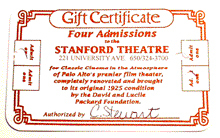4: Art
For David Raksin, writing music for films was a job. The studio cared less whether the music was right for the film than whether it was done by Thursday. These are Raksin’s words, as well as I remember them. He said he had no problem writing tunes. He could write them as easily as other men drink beer. His idea of Laura was different from Otto Preminger’s, the producer. You’d be surprised, he said, what producers and directors think they put into a film but just isn’t there. Preminger thought that Laura was a whore and wanted to use “Summertime.” Raksin said “Summertime” was a great song but it wasn’t right for this film. For him, Laura was a troubled beauty, a woman whom everyone loved, so talented, so kind to everyone, but whom only one man could have. Raksin convinced Preminger to give him a chance to write the theme. He started working on Friday evening and wrote tune after tune, so many that he didn’t write them all down, but none was right. He was married at the time to a wonderful woman, an actress, who was in a play in New York, so he worked alone in his apartment. On Saturday, he got a letter from his wife. He opened it, but her words didn’t make sense to him, so he shoved the letter in his jacket pocket. On Sunday, he was still writing tunes and none of them would do. On through the day and it was Sunday evening. Then he used a trick he had often used to overcome writer’s block. He would put a poem or a picture on the music stand and read it to distract himself. Almost without thinking, he pulled the letter out of his pocket, and read it again, but, this time, it came to him with a shock that his wife was telling him to get lost and she wished it could happen in retrospect. Then the melody for Laura came to him.
